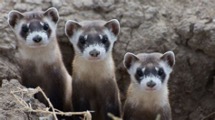Division of Mammals
open weekdays 8am - 5pm
visitors welcome by appointment
information for visitors
phone: (505) 277-1360
fax: (505) 277-1351
museum administrator
open weekdays 8am - 5pm
visitors welcome by appointment
information for visitors
phone: (505) 277-1360
fax: (505) 277-1351
museum administrator
Museums play a multitude of roles in research, natural resource management, and education. When specimens are preserved correctly and extensively, their long-term use can extend over different conservation efforts and available technologies. It is difficult to predict what new technology will be available years from now or what our primary conservation concerns will be. A few decades ago, we would not have believed we could uncover genomic variation, wildlife diseases caused by viruses, isotopic ecology, persistent pollutants like PFAS, or even clone extinct or threatened species, but today museum collections form the basis of a wide diversity of studies and management inititiaves on endangered species. Therefore, it is absolutely urgent that we focus on the critical need to build spatially broad, temporally deep, and taxonomically diverse libraries of biodiversity, such as that found in in natural history collections,
Specimens that represent the span of many years provide the primary infrastructure for studying how populations adapted, evolved, and diversified over time. Museums now build frozen tissue archives that are essential for investigations of how environments are changing and impacting species and biotic communities. Samples also provide insight into historic ranges, baseline conditions, and critical niche data that can be used to identify reintroduction areas and future projections of environmental suitability for captive-bred endangered animals.
Check out a few examples of endangered species to see how museums have played a role in their conservation:
| Black-footed ferret (Mustela nigripes) Photo © Kimberly Fraser/USFWS |
Mexican gray wolf (Canis lupus baileyi) |
New Mexico meadow jumping mouse (Zapus luteus luteus) |
 |
|
|